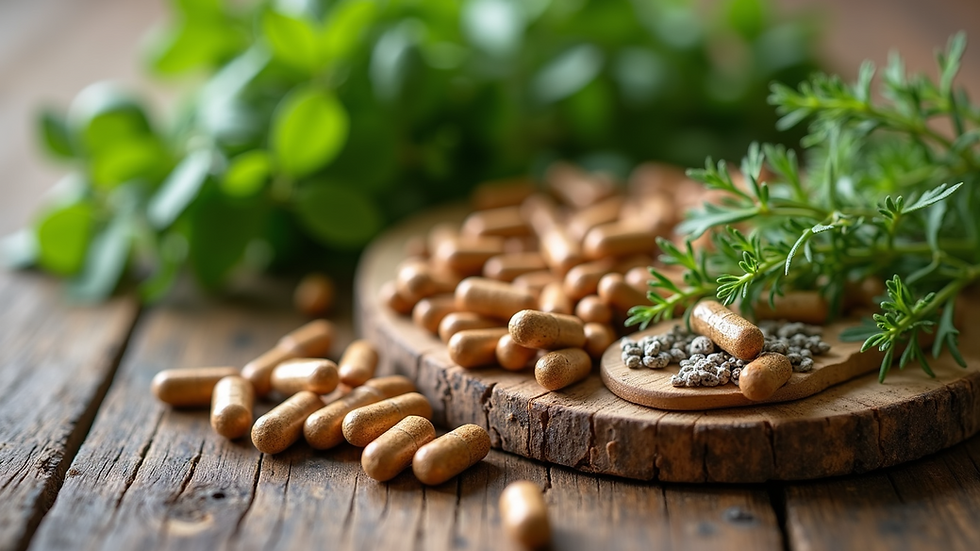What to Know About Supporting Liver Health Naturally
- Drs Blend Cleanse ,LLC

- Aug 24, 2025
- 3 min read
The liver is one of the most vital organs in the body. It plays a crucial role in detoxification, metabolism, and nutrient storage. Supporting liver health naturally can help maintain its function and prevent diseases. This article explores practical ways to care for your liver using natural methods, including diet, lifestyle changes, and supplements.
Understanding Liver Health and Its Importance
The liver performs over 500 essential functions, including filtering toxins from the blood, producing bile for digestion, and regulating blood sugar levels. When the liver is overworked or damaged, it can lead to serious health problems such as fatty liver disease, cirrhosis, or liver cancer.
Maintaining liver health means supporting these functions through healthy habits. This includes eating a balanced diet, avoiding excessive alcohol, and managing weight. The liver also benefits from regular exercise and staying hydrated.
Key Functions of the Liver:
Detoxifies harmful substances
Produces bile to aid digestion
Stores vitamins and minerals
Regulates blood clotting
Metabolizes fats, proteins, and carbohydrates

Practical Tips for Supporting Liver Health
Supporting your liver naturally involves simple lifestyle changes that can have a big impact. Here are some actionable recommendations:
1. Eat Liver-Friendly Foods
Certain foods are known to promote liver health. These include:
Leafy greens like spinach and kale
Cruciferous vegetables such as broccoli and Brussels sprouts
Garlic and onions, which contain sulfur compounds
Fatty fish rich in omega-3 fatty acids
Nuts and seeds for healthy fats
2. Stay Hydrated
Water helps flush toxins from the body and supports liver function. Aim for at least 8 glasses of water daily.
3. Limit Alcohol Intake
Excessive alcohol consumption is a leading cause of liver damage. Moderation is key to protecting your liver.
4. Exercise Regularly
Physical activity helps reduce liver fat and improves overall metabolism. Aim for at least 150 minutes of moderate exercise per week.
5. Avoid Toxins
Limit exposure to chemicals found in cleaning products, pesticides, and cigarette smoke, which can burden the liver.

What is the Best Natural Remedy for the Liver?
Many natural remedies have been studied for their liver-supporting properties. Some of the most effective include:
Milk Thistle
Milk thistle is a popular herb known for its antioxidant and anti-inflammatory effects. It contains silymarin, which may help protect liver cells from damage and promote regeneration.
Turmeric
Curcumin, the active compound in turmeric, has powerful anti-inflammatory and antioxidant properties. It may help reduce liver inflammation and improve liver enzyme levels.
Dandelion Root
Dandelion root is traditionally used to support liver detoxification and bile production. It may also help reduce symptoms of liver congestion.
Green Tea
Rich in antioxidants called catechins, green tea can help reduce oxidative stress in the liver and improve fat metabolism.
Artichoke Leaf
Artichoke leaf extract may promote bile flow and protect liver cells from toxins.
In addition to these herbs, incorporating natural supplements for liver health can provide targeted support. These supplements often combine several liver-friendly ingredients to enhance overall liver function.

Lifestyle Habits to Avoid for a Healthy Liver
While focusing on what to add to your routine is important, it is equally vital to avoid habits that harm the liver:
Excessive Alcohol: Chronic heavy drinking can cause fatty liver, hepatitis, and cirrhosis.
Unhealthy Diet: High intake of processed foods, sugar, and unhealthy fats can lead to fatty liver disease.
Smoking: Tobacco toxins increase oxidative stress on the liver.
Overuse of Medications: Some medications, especially painkillers like acetaminophen, can damage the liver if taken in excess.
Sedentary Lifestyle: Lack of exercise contributes to obesity and liver fat accumulation.
By avoiding these risk factors, you give your liver a better chance to function optimally.
Monitoring Liver Health and When to Seek Help
Regular check-ups and liver function tests can help monitor liver health. Symptoms of liver problems may include:
Fatigue and weakness
Jaundice (yellowing of skin and eyes)
Abdominal pain or swelling
Dark urine or pale stools
Nausea or loss of appetite
If you experience any of these symptoms, consult a healthcare professional promptly. Early detection and intervention can prevent serious liver damage.
Supporting liver health naturally is achievable through mindful eating, lifestyle choices, and the use of safe supplements. By understanding the liver’s role and how to care for it, you can promote long-term wellness and vitality. Taking small, consistent steps today can lead to a healthier liver tomorrow.
To explore high quality supplements and detox options visit




Comments